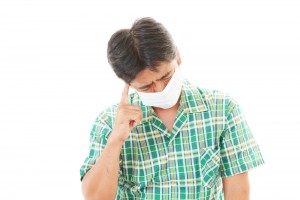 Cold sores are painful, unsightly and highly contagious sores characterized by fluid filled blisters that burst and crust over. There is no cure for cold sores, but there are a number of ways to prevent and treat flare ups.
Cold sores are painful, unsightly and highly contagious sores characterized by fluid filled blisters that burst and crust over. There is no cure for cold sores, but there are a number of ways to prevent and treat flare ups.
First, let’s talk a little bit about what a cold sore is and what causes it. Cold sores, also known as fever blisters, are painful and highly contagious sores that most often appear around the mouth, but can appear on the cheeks and around the nose. Cold sores are caused by one of two types of herpes simplex virus. It is most often spread by direct skin contact, especially kissing, but it can also spread by indirect contact, such as when sharing utensils, lip balms or towels, or if you touch the blister, then shake someone’s hand and they touch their face. If you get cold sores, be especially careful around children, as they can experience severe complications, especially if they touch the sores and spread the virus to their eyes.
Prevention
There are a few conditions that can increase your chances of an outbreak:
- Stress
- Illness
- Weakened immune system
- Diet high in acidic foods
- An amino acid called Arginine
The more you can eliminate these and the stronger your immune system, the more you can reduce your chances of a flare up. Boosting your immune system is essentially a matter of a healthy lifestyle. Eat a healthy diet low in acidic foods, reduce stress and take a quality multivitamin. Extra B vitamins can help reduce stress and extra Vitamin C can help boost your immune system overall.
In addition to this, the herpes virus uses the amino acid Arginine to get into the cells. So minimizing your Arginine will also help to prevent cold sores. Unfortunately, Arginine is everywhere. It’s found in some vegetables, many red meats, fast foods and sodas, and all nuts, seeds, chocolate and sweets. Unfortunately, Arginine is so abundant that while it’s possible to eliminate, it’s not a lifestyle that most people can sustain in the long term. Fortunately, there is another amino acid that can neutralize Arginine. Lysine gets into the cells and blocks the action of Arginine. It is found in poultry, fish, eggs, cheese, milk, and seaweed. Of course, you can also ensure you’re getting enough by taking a high quality supplement.
Treatment
Prevention is great and will minimize your outbreaks, but there will be times when you still get blisters despite your vigilance. When this happens, the first thing you want to do is double down on all those things you do in the name of prevention. More vitamins, more lysine and more stress reduction.
At the first sign of tingling, using an over the counter antiviral cream may stop the blister before it forms. Even better, try Herdox. When used before the blister appears, it can help stop it in its tracks. If used after the blister has started, the ingredients in Herdox can help the healing time.
If a blister does form, try an ointment containing benzocaine, such as toothache gel, to numb the pain and don’t touch the sore! Touching the sore can introduce infection-causing bacteria and gets the virus on your fingers and spread to everything you touch. Wash your hands before and after applying any product to the sore.
The following steps can help you avoid reintroducing the virus and causing additional blisters:
- Discard or sterilize your toothbrush
- Discard any lipsticks or lip balms you may have used during your outbreak
- Wash any washcloths or towels you used during your outbreak.
My best friend has been getting a lot of cold sores lately. So I have been trying to figure out why she is getting them and if there is a way to prevent them. I had no idea that they can be caused by stressed. She just got a new job and is pretty stressed at the moment. I wonder if her trying to relax a bit more will help her stop getting the sores.